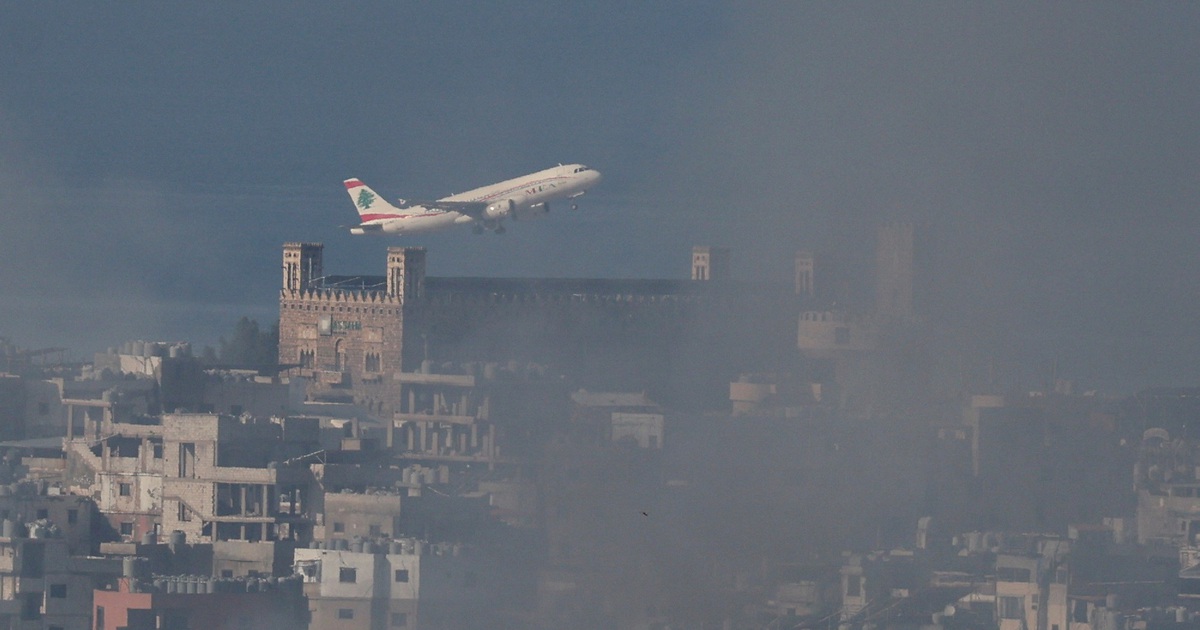rironing ro Thidden
Some pilots working at airlines are said to be dissatisfied when the management company keeps flight routes into the airspace of hot spots in the Middle East.
A flight of Middle East Airlines (Lebanon) took off from Beirut, Lebanon in October
Reuters on December 23 quoted a pilot from Wizz Air (Hungary) complaining that he was ordered to fly over Iraq at night, amid escalating regional tensions in late September. “A few days later, Iraq closed the airspace after Iran launched a series of missiles at Israel on October 1. That confirmed my suspicions about insecurity,” the pilot said. In a statement, Wizz Air confirmed that the airline had attacked. risky price Be careful before deciding to fly over Iraqi airspace, as well as follow the instructions of the European Union Aviation Safety Agency (EASA).
The bottleneck causing confusion comes from the fact that airline assessments are partly based on third-party intelligence information, while pilots do not receive this information. Reuters said there were 9 letters from 4 European unions representing pilots and cabin crew expressing concerns about safety when flying over the Middle East. In general, the union requires airlines to be transparent when deciding to fly over dangerous areas, and wants pilots to have the right to refuse to take unsafe flights.
Fighting in the Middle East is unpredictable as opposing forces continuously launch missile attacks on each other, and there is now increased concern about instability with political developments in Syria. There have been aviation tragedies such as Malaysia Airlines flight MH17 being hit by a missile in Ukrainian airspace in 2014 or the Iranian military mistakenly shooting down Ukraine International Airlines flight PS752 in Tehran City in 2020. Pilots said that Accidental misfire in the chaos of combat and the risk of an emergency landing were primary concerns.
Supreme Leader Khamenei says Iran ‘does not have and does not need proxy forces’
Faced with the situation in the Middle East, airlines Lufthansa (Germany) and KLM (Netherlands) no longer fly over Iran. The above two airlines also allow cabin crew to refuse flights they feel are unsafe. Wizz Air has suspended flights to and from Tel Aviv City (Israel). The remaining few will rely on guidance from EASA, considered by industry experts to be the most stringent safety regulator in the region.
Not easy to change
The Middle East is an important corridor for planes from Europe to reach India, Southeast Asia, Australia and vice versa.
According to data from the aviation safety monitoring organization Eurocontrol (headquartered in Belgium), it is estimated that in 2023 there will be about 1,400 flights to and from Europe flying through the Middle East every day. To completely avoid Middle East hot spots is not an easy problem for airlines. Choosing to fly around Central Asia, Egypt or Saudi Arabia will increase costs and is usually only used by private pilots. For example, an unnamed airline flying between Singapore and London in August had to pay more than $4,700 in transit fees when flying through Afghanistan and Central Asia, 50% more expensive than when flying through the Middle East.

The Middle East conflict raises safety concerns for commercial flights
General Director (CEO) of AirBaltic Airlines (Latvia) Martin Gauss said his company complied with international safety regulations and did not need to make adjustments. Meanwhile, CEO of Ryanair (Ireland) Michael O’Leary affirmed: “If EASA confirms safety, then frankly, we don’t care what the unions or some pilots think.”
EASA said it has participated in discussions on safety issues related to the situation in the Middle East. Meanwhile, the aviation industry will pay attention to moves to adjust flights through the Middle East from some large Gulf airlines such as Etihad, Emirates or Flydubai, businesses that are said to have detailed intelligence information.







